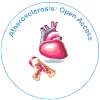Inflammation and Immunological Responses in Atherosclerosis: Origins and Therapeutic Targets for Innovative Cardiovascular Disease (CVD) Therapies
Received Date: May 02, 2023 / Accepted Date: May 30, 2023 / Published Date: May 31, 2023
Abstract
This study focuses on atherosclerosis, a prominent cause of cardiovascular disease (CVD). Atherosclerosis is a chronic inflammatory disorder characterised by immunological competent cells in lesions that primarily generate proinflammatory cytokines. The presence of dead cells and oxidised versions of low density lipoproteins (oxLDL) is significant in this syndrome. The rupture of atherosclerotic plaques is the main cause of CVD. At larger concentrations, oxLDL has features that promote inflammation and immunological activation, causing cell death. It also includes inflammatory phospholipids, notably phosphorylcholine (PC), which is an intriguing epitope. Antibodies that target PC (anti-PC) may have atheroprotective benefits, possibly due to their anti-inflammatory qualities. While the participation of bacteria and viruses in atherosclerosis has been discussed, direct proof has been difficult to come by, and antibiotic studies have failed. Heat shock proteins have the potential to be targets for atherogenic immune responses. Pro-inflammatory cytokines, chemokines, and lipid mediators are other contributors in plaque rupture. To establish inflammation as a cause of atherosclerosis and CVD, clinical trials using anti-inflammatory and immune-modulatory therapy are required. This review investigates the possible origins of immunological responses and inflammation in atherosclerosis, as well as therapeutic techniques that target inflammation for innovative CVD therapies.
Citation: Coppe G (2023) Inflammation and Immunological Responses inAtherosclerosis: Origins and Therapeutic Targets for Innovative CardiovascularDisease (CVD) Therapies. Atheroscler Open Access 8: 211. Doi: 10.4172/asoa.1000211
Copyright: © 2023 Coppe G. This is an open-access article distributed under theterms of the Creative Commons Attribution License, which permits unrestricteduse, distribution, and reproduction in any medium, provided the original author andsource are credited.
Share This Article
Open Access Journals
Article Tools
Article Usage
- Total views: 933
- [From(publication date): 0-2023 - Mar 31, 2025]
- Breakdown by view type
- HTML page views: 676
- PDF downloads: 257
